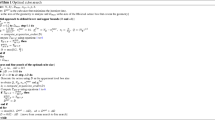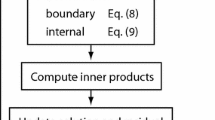Abstract
Large electromagnetic simulations are needed for improvement of design in industry. Up to now, the previous limits in the scalability of the available codes were an important barrier. In this work, an efficient parallel implementation of the fast multipole method (FMM) combined with the fast Fourier transform (FFT) is presented. The good scalability of the parallel FMM-FFT, combined with some performance improvements, has shown to be very effective when using large parallel high performance supercomputers. A challenging problem with more than 0.5 billion unknowns has been solved in the Finis Terrae Supercomputer recently. This is the largest problem analyzed in computational electromagnetics to date, which confirms that the proposed implementation of the FMM-FFT constitutes a very interesting alternative to the more frequently used multilevel FMM algorithm (MLFMA).
Similar content being viewed by others
References
Harrington RF (1993) Field Computation by Moment Method. IEEE Press, New York
Coifman R, Rokhlin V, Wanzura S (1993) The fast multipole method for the wave equation: A pedestrian prescription, IEEE Antennas Propagat Mag, Vol. 35, No. 3, 7–12 June
Song JM, Chew WC (1995) Multilevel fast multipole algorithm for solving combined field integral equations of electromagnetic scattering. Microw Opt Technol Lett 10:14–19
Song JM, Lu CC, Chew WC (1997) Multilevel fast multipole algorithm for electromagnetic scattering by large complex objects, IEEE Trans Antennas Propag 45:1488–1493
Song JM, Lu CC, Chew WC, Lee S (1998) Fast Illinois solver code (FISC), IEEE Antennas Propag Mag 40(3):27–34
Velamparambil S, Song JM, Chew WC, Gallivan K (1998) Scaleme: A portable scalable multipole engine for electromagnetic and acoustic integral equation solvers, IEEE Antennas Propag Soc Int Symp 3:1774–1777
Velamparambil S, Schutt-Aine JE, Nickel JG, Song JM, Chew WC (1999) Solving large scale electromagnetic problems using a linux cluster and parallel MLFMA. IEEE Antennas Propag Soc Int Symp 1:636–639
Velamparambil S, Song JM, Chew WC (1999) A portable parallel multilevel fast multipole solver for scattering from perfectly conducting bodies. Proc. IEEE Antennas Propag Soc Int Symp 1:648–651
Velamparambil S, Chew WC, Hastriter ML (2002) Scalable electromagnetic scattering computations. IEEE Antennas Propag Soc Int Symp 3:176–179
Velamparambil S, Chew WC, Song JM (2003) 10 million unknowns: Is it that big? IEEE Antennas Propag Mag 45(3):43–58
Hastriter ML (2003) A study of MLFMA for large-scale scattering problems, PhD thesis, University of Illinois at Urbana-Champaign
Sylvand G (2003) Performance of a parallel implementation of the FMM for electromagnetics applications. Int J Numer Meth Fluids 43:865–879
Have P (2003) A parallel implementation of the fast multipole method for Maxwell’s equations. Int J Numer Meth Fluids 43:839–864
Velamparambil S, Chew WC (2005) Analysis and performance of a distributed memory multilevel fast multipole algorithm. IEEE Trans Antennas Propag 53(8):2719–2727
Ergül Ö, Gürel L (2006) Efficient parallelization of multilevel fast multipole algorithm. Proc Europ Conf Antennas Propag (EuCAP)
Gürel, L, Ergül Ö (2007) Fast and accurate solutions of extremely large integral-equation problems discretised with tens of millions of unknowns. Electron Lett 43(9):499–500
Ergül Ö, Gürel L (2007) Parallel-MLFMA solution of CFIE discretized with tens of millions of unknowns, Proc 2nd Europ Conf Antennas Propag (EuCAP)
Ergül Ö, Gürel L (2008) Hierarchical parallelization of the multilevel fast multipole algorithm for the efficient solution of large-scale scattering problems. Proc IEEE Antennas Propag Soc Int Symp
Ergül Ö, Gürel L (2008) Efficient parallelization of the multilevel fast multipole algorithm for the solution of large-scale scattering problems. IEEE Trans Antennas Propag 56:2335–2345
Gürel L, Ergül Ö, Malas T (2008) Solutions of extremely large electromagnetics problems involving tens of millions of unknowns using parallel MLFMA and preconditioners. XXIX General Assembly of the International Union of Radio Science, Chicago, Illinois, USA
Wagner R, Song JM, Chew WC (1997) Montecarlo simulation of electromagnetic scattering from two-dimensional random rough surfaces. IEEE Trans Antennas Propag 45(2):235–245
Waltz C, Sertel K, Carr MA, Usner BC, Volakis JL (2007) Massively parallel fast multipole method solutions of large electromagnetic scattering problems. IEEE Trans Antennas Propag 55(6):1810–1816
Saad Y, Schultz M (1986) GMRES: A generalized minimal residual algorithm for solving nonsymmetric linear systems. SIAMJ Sci Statist Comput 7:856–869
Rao SM, Wilton DR, Glisson AW (1982) Electromagnetic scattering by surfaces of arbitrary shape. IEEE Trans Antennas Propagat 30:409–418
Author information
Authors and Affiliations
Corresponding author
Rights and permissions
About this article
Cite this article
Mouriño, J.C., Gómez, A., Taboada, J.M. et al. High scalability multipole method. Solving half billion of unknowns . Comp. Sci. Res. Dev. 23, 169–175 (2009). https://doi.org/10.1007/s00450-009-0075-7
Published:
Issue Date:
DOI: https://doi.org/10.1007/s00450-009-0075-7




